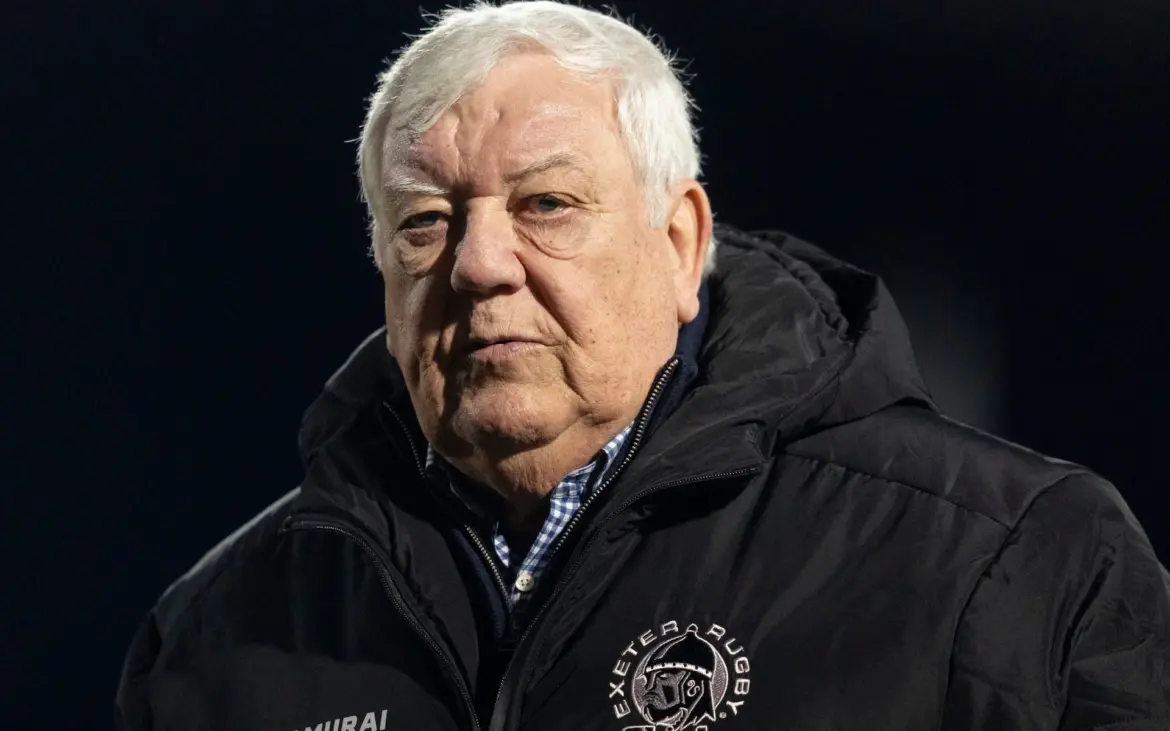It’s late morning in Exeter, and Tony Rowe sits down at the Sandy Park Hotel with a cappuccino in hand.
The rugby boss looks relaxed, but his mind is elsewhere.
“I’m not looking forward to November,” he admits.
“The Budget’s coming. Most of my friends have already left the country, taken their money with them.
The Chancellor wants to go after people who aren’t considered ‘working class.’
But I left the Royal Marines at 23 with just £500. Nobody handed me money. Am I not working class?”
While many of his peers have moved to Portugal or Spain to avoid tax hikes, Rowe says he’s staying put in Devon. “I’ll fight it. I like a good fight.”
A Man Who Doesn’t Sit on the Fence
Rowe’s career has been defined by bold decisions since he took over the Exeter Chiefs in 1998.
He’s never been afraid of conflict—whether it was rejecting CVC’s Premiership investment or tearing into his players after a humiliating 79–point defeat to Gloucester.
For him, rugby is not just about sport but also survival in tough financial conditions.
“Everything depends on people’s disposable income,” he explains.
“Bills are higher, taxes are higher. The big question is: after all that, do people still have enough left to come to Sandy Park?”
Why English Rugby Needs Urgent Reform
The financial pressure on clubs is no secret. Several—Worcester, London Irish, Wasps—have already gone bankrupt.
Rowe believes the league structure itself is broken and needs to expand.
“Ten clubs don’t generate enough revenue. We need 12, ideally 14. At Exeter, a Premiership game is a million-pound day. Extra games make a huge difference.”
He also wants an end to automatic relegation.
“Sponsors don’t want to back clubs in the Championship.
Some of my sponsorship contracts even have clauses that cancel the deal if we get relegated. That’s not sustainable.”
Rowe is open to bigger ideas too: Welsh teams joining, clubs from Yorkshire or Kent, even a 16-team league split into conferences.
“We have to think about growth, not limits.”
The Broadcast Deal and Broken Promises
Rowe remains frustrated with the long-term TV deal clubs are locked into.
He recalls a meeting where TNT Sports executives promised better opportunities if the league slimmed down to 10 teams.
“Well, we lost three clubs, we’re at 10 now, and what happened? They offered us less money. Next time I see him, I’ll be challenging him on that.”
For Rowe, more games and more clubs should mean more TV revenue.
But until broadcast money matches the ambition, clubs are stuck.
Lessons From a Tough Season
Last year was one of Exeter’s most difficult campaigns.
The team lost seven straight games, coaches were suspended, and Rowe had to step in and restore Rob Baxter to a hands-on role.
Looking back, he admits he made mistakes.
“I pulled Rob away from coaching. That was wrong. We needed him on the field, not moving deck chairs on the Titanic.”
The financial scars of the pandemic still linger.
“We lost over £20 million. We weren’t ready for that hit. The cupboard was bare.”
Building Again With Experience and Youth
Despite the setbacks, Rowe is upbeat.
He points to the arrival of Wallabies Len Ikitau and Tom Hooper as the kind of signings that can elevate the club’s young core.
“It’s about balance—young talent mixed with old heads. That’s how we reached new heights before, and it’s how we’ll do it again.”
The academy pipeline is strong too. Several young Chiefs starred at the Under-20s World Cup in 2024, and Rowe believes the club’s homegrown talent is better than it’s been in years.
“We’re close to the salary cap, we’ve got the right mix, and we’re aiming high. By 2028, we want to be one of the top eight clubs in the world competition.”
The Threat of a Breakaway League
The proposed R360 global league looms as a potential disruptor, offering players massive salaries.
Rowe, however, remains skeptical. “On paper, it looks glamorous—traveling the world, big money. But it’s risky.
What if a sponsor pulls out? What if you get injured?
Careers are short, and I get why players want to cash in, but this could be a circus that collapses.”
Instead, he believes English rugby should focus on a solid domestic foundation.
“Franchising, expanding to 12 or 14 clubs—that’s the way forward.”
The Fire Still Burns
Now in his seventies, Rowe shows no signs of losing his edge.
He leans forward, fists on the table, a grin spreading across his face.
“I started this in 1998, and I’ll keep at it until the club is fully self-sustainable.
We were on the edge during Covid, but last season we finally traded in profit.
We didn’t expect trophies last year, but now—we’re ready. We’re back. Look out.”
